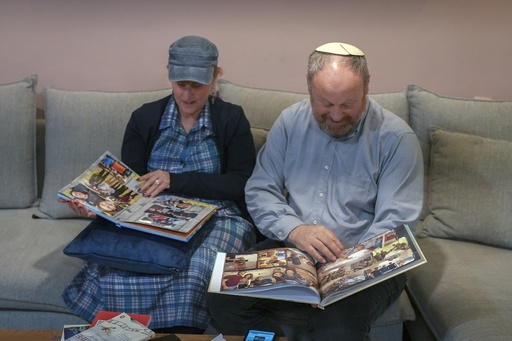Modiin, Israel — Yona Brief, a dual citizen of Israel and the U.S., battled for over 400 days following severe injuries sustained during the Hamas assault on October 7, 2023. Unfortunately, his struggle came to an end in late November after losing both legs and facing numerous medically induced comas. His story has become emblematic of the sacrifice experienced by countless fallen soldiers in a conflict that many in Israel regard as vital for the nation’s existence.
“It represented resilience,” shared his mother, Hazel, about his enduring spirit. His father, David, drew a parallel between Yona and the everlasting oil from the Hanukkah story, which burned longer than anticipated, reflecting Jewish tradition’s message of hope.
Since the October attack, over 800 Israeli soldiers have lost their lives, with approximately 300 casualties occurring on the initial day. The ongoing conflict in Gaza has claimed nearly 45,000 Palestinian lives, while more than 3,500 have died in Lebanon as reported by local health officials. In Israel, mandatory military service is expected for most Jewish citizens, and the sacrifices made by soldiers are held in high esteem. Historically, significant casualties among military personnel have swayed public sentiment during times of war.
Brief was already sustaining serious wounds prior to being deployed on October 7, having previously been injured by a pipe bomb during a raid in the occupied West Bank. It was his first duty weekend following his recovery, and as militants launched their offensive from Gaza, he swiftly joined efforts to support the Israeli military’s operations in various communities.
According to his father, Brief’s unit was tasked with clearing vulnerabilities in Kibbutz Kfar Aza when they were ambushed, resulting in two soldiers losing their lives. In a brave attempt to assist a fellow soldier, Brief was shot multiple times. He utilized his medical training to apply tourniquets around his injured legs, managing to drag himself and his comrade into a nearby house that had been hit by bullets. The family sheltering there later recounted how Brief arrived “full of blood.”
He was evacuated to the hospital hours later, but sadly, his commanding officer succumbed to their injuries at the scene. His hospital experience was fraught with difficulty; Brief was the most severely injured patient from the October attack to receive care at Sheba Medical Center in Tel Aviv, the largest medical facility in the country.
Following the amputation of his legs, Brief fluctuated between life and death, undergoing over 20 surgical procedures. Reports indicate he received more than 200 units of blood, with specialists from around the world brought in to assist in his treatment. The family of Hadas Eilon-Carmi, who sheltered him during the ambush, grew very close to Brief’s family, visiting him often and hoping for his recovery. “Yona embodies everything I aspire for an Israeli to stand for,” Eilon-Carmi remarked.
Despite spending time in medically induced comas, Brief often found moments of lucidity and exhibited a lively spirit, inspiring his medical team during a time filled with despair. He made efforts to stay positive, working out in his hospital bed and engaging joyfully with visitors. On occasion, he even returned home for brief visits before his medical condition necessitated his return to the hospital.
Though his parents witnessed flashes of happiness throughout the nearly 14 months following his injury—culminating in special meals prepared by chefs and performances by renowned musicians at his bedside—the strain of lengthy treatments ultimately proved too great for his liver, leading to its failure. Brief’s funeral was attended by hundreds, and heartfelt tributes flowed in from across Israeli society.
“With Yona, each day was a battle for survival, and that is why his acts of bravery remain extraordinary,” noted Chili Tropper, an Israeli opposition member who became close to Brief and his family. “For him, the struggle lasted 417 days, with each day representing a new fight.”



